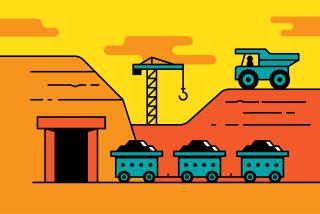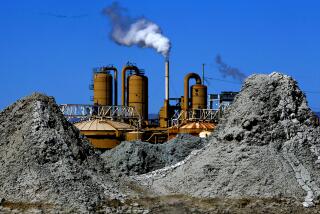Mining firm will have new digs in Azusa
They spent their nights and weekends knocking on doors, shaking hands, providing yard signs and selling T-shirts. Somewhere in their city of 47,000, they believed, were others as outraged by the city’s deal to let a mining company dig into the hillside that stood sentry above their San Gabriel Valley neighborhoods.
But when Azusa residents went to the polls to decide the fate of the mining operation, the grass-roots opposition was buried.
“We were outmanned, outspent and outgunned,” Jeri Vogel of Azusans Against Mining Expansion said last week after more than two-thirds of the voters in the special election agreed to let Vulcan Materials Co. carve up the foothill of Van Tassel Ridge.
“I cried a bit, but most of all I was numb,” Vogel, 50, said. “The odds were we probably wouldn’t win, but we were optimistic.”
At stake was a plan by Vulcan to shift 80 acres of its operations in Azusa’s foothills to the western portion of its property.
For years, Vulcan has operated a rock quarry at the mouth of Fish Canyon, a deep gorge in the foothills long favored by hikers. But the company said it wanted to streamline its operations by moving closer to its processing facility.
Some residents worried the excavation would increase pollution and noise and destroy a scenic ridge. They were also wary of the company’s plan for re-vegetating the hillside with a technology known as micro-benching.
At first it appeared the proposal had little chance. Vulcan, based in Birmingham, Ala., was up against angry residents who jammed City Hall meetings and lambasted the company’s motives and mining in general. Residents in adjacent Duarte demanded Azusa take its western neighbors into consideration, pointing out that they had the most direct views of the hillside. Duarte’s mayor even threatened to boycott Azusa businesses and rode her bike to Azusa City Hall to drop off hundreds of letters protesting the proposal.
In May, the Azusa City Council rejected the proposal. Two months later, after Vulcan amended the agreement to include more financial incentives and pledged to create a trailhead to Fish Canyon Falls within a year, council members changed their minds.
Residents petitioned for last Tuesday’s referendum election, but only 3,000 voters participated. “I thought because it was such a hot item there would be more people,” said Azusa Mayor Joseph Rocha, the lone council member to vote against the proposal. “I did not agree with the vote, but I respect the majority. The people showed us what they wanted to happen.”
Resident Richard Deem, an opponent of the plan, said he knew it would be tough to side against the largest construction materials company in the nation.
Vulcan “put out lots of fancy, colorful fliers with deceptive statements and played up the economy issue, saying it was going to create jobs,” Deem, 56, said. “They had a really brilliant strategy.”
The opponents’ last hope is a lawsuit filed in August by the city of Duarte that seeks to overturn the certification of environmental reports showing that the rock quarry will have no major effect on either city, aside from aesthetics. A hearing is scheduled for mid-February.
Many Azusa residents would just as soon see Vulcan go away, but little can be done about a 50-year mining permit that was approved in 1988. Various companies have explored the area near Fish Canyon for valuable hard granite, which is crushed into aggregate used to build highways and pave riverbeds. Vulcan took over the property more than a decade ago and is mining an eastern section of its 270 acres.
“Nobody likes mining, but at the same time we need the material from there,” said Elizabeth Ramirez, 30, an Azusa resident who was hired by Canyon City Alliance, a coalition financially supported by Vulcan. “San Gabriel Valley is a growing area, and that mine does provide a lot of material for the area.”
Shifting the mining to Van Tassel Ridge is a trade up for residents and hikers alike, supporters say. The company will employ micro-benching, which it says is a less visible rehabilitation technique than the step-like gashes commonly left after hillside mining. The process will allow Vulcan to re-vegetate as it goes. About $65 million in revenue is expected to be generated for the city, and the agreement includes a stipulation that does not allow the mining permit to be extended.
Outdoors enthusiast Dan Simpson, who has lived in Azusa for 21years and operates a local hiking website, said he found that a lot of opponents were uneducated about Vulcan’s proposal and its benefits to the environment and community.
“It’s really easy to say ‘no’ as opposed to looking objectively at things,” Simpson, 56, said. “You have people who just don’t understand the issues, never looked carefully at it and have a bad image of big businesses and mining, so lash out against it. But from an environmental standpoint, this is far superior than the current plan.”
More to Read
Sign up for Essential California
The most important California stories and recommendations in your inbox every morning.
You may occasionally receive promotional content from the Los Angeles Times.










